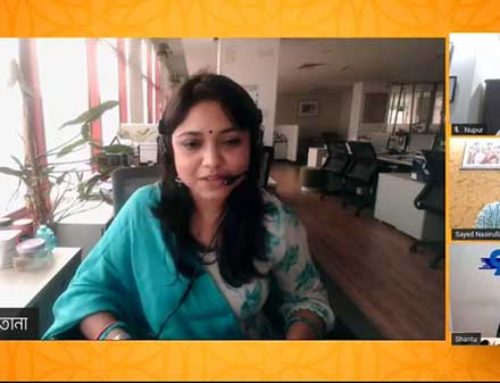Introduction of the organisation
Association for Land Reform and Development (ALRD) was established in January 1991 as a single focused right based independent national policy advocacy and networking organization committed to promote and strengthen the land rights and agrarian reform.
Partnership and networking modalities with allies and stakeholders are the strength and aspiration of ALRD to continue its endeavour realizing poor and marginalized communities’ rights over land and natural resources. Currently ALRD has a network of 200+ NGOs and civil society organizations spread across the country.
Since its establishment, ALRD’s policy advocacy, mobilization, networking and capacity building activities together with its partners and allies and citizens campaign have resulted in significant changes and reforms with regard to policies, laws and strengthening of multi-dimensional approach and process.
Programmatic interventions in response to COVID-19
As a lash of COVID-19, millions of rural landless and small-scale family farmers and a huge number of daily wage earners in the urban area have lost their job and that lead them to live with little or no food, and limited support. The indigenous peoples in Chittagong Hill Tracts (CHT) and plain who are mostly dependent on Jum cultivation and daily wages are facing shortage of food and other daily essentials. With limited mobility and transport, the lean period, April to June, has been emerged with sever vulnerability not only among the fragile indigenous families infected by measles but also among the indigenous families depended on Jum in CHT.
Along with these, evicted Santal indigenous communities from land in Gaibanda, Gobindaganj, rural families in Haors and some remote Char land families in coastal area are at the risk of hunger and poverty being hard to reach the emergency package announced by the government.
From the very beginning of COVID-19 crisis, ALRD has been engaged in online consultation with networks partners, allies and development partners and assessing the need of these fragile communities. Based on the regular consultation, in response to the COVID-19 crisis, it has been decided that ALRD will come with the three emergency responses:
- The awareness campaign and health messages dissemination is going on through all feasible, innovative methods like TV scroll through local cable operators;
- In the coming days, emergency legal assistance will be extended to the families who are at risk of getting evicted, may become the victims of human rights violation and land evictions.
- Monitoring human rights violation and corruption in aid distribution through ALRD partners in different geographical locations.
- Emergency livelihood/food support in a limited scale to the vulnerable communities mostly to the Dalit communities, Indigenouspeople in the CHT and plain land;
ALRDs programmatic interventions in response to COVID-19
1. Awareness raising on COVID-19
- To raise awareness among the community on COVID-19, ALRD developed 50,000 leaflets following the WHO guidelines and distributed to the ALRD partners.
- ALRD developed this material available in both soft and printed forms. Some Partner NGOs reprinted this awareness material for wider circulation.
- ALRD, in consultation with its partners, developed awareness messages and have been telecasting at the local cable network across the country.
- For wider impact in the society, ALRD initiated to telecast the awareness messages in the television channel particularly on Channel-I and Desh TV on COVID post impact in Agriculture and other sectors.
- ALRD is regularly communicating with the limited Partner NGOs through several online media, and also developed a monitoring format to gather information for further possible action.
2. Emergency legal assistance will be provided against any kind of violation of human rights, land rights, evictions etc.
3. It has been observed that even in this COVID-19 crisis human rights situation goes down and several attempts made by the local influential goons to evict the minority communities and indigenous peoples. Moreover, those who are severely in need of food in this situation are not getting access to the government support due to corruption. Considering this situation, ALRD along with its partner NGOs monitoring human rights violation and corruption in aid distribution
4. Emergency response like food and other essential stuffs to the 3000 families
- (among the indigenous families in the CHT and plain lands,
- rural landless and small family farmers in Haor, Chalanbeel, Charlands and
- Dalits communities in urban area etc.)
- Due to the Corona crisis, sharecropper/smallholding farmers/family farmers are in difficulties harvesting and selling their crops along with other agricultural products. Even this lockdown situation, some of ALRD/partners in the respective areas lobbied with the local administration for immediate action.
Potential challenges of COVID-19:
- Due to lockdown situations, like others, partners of ALRD are in difficulties performing their planned activities, communicating with, and mobilizing resource and food crises for their targeted communities and government agencies.
- April-May-June is the lean period for the IPs who are dependent on shifting (jum) cultivation in the CHT. Due to the country-wide lockdown, the situation is getting worse and a very limited number of local transports like boats are able to carry essential food stuffs to remote areas of CHT.
- Rural landless and small-scale family farmers, IPs and minority communities in the plain are mainly day labourers. Due to the Covid-19 crisis, they lost their job and income. To response the immediate crisis, ALRD suggested to the local CSO representatives and NGOs to communicate with local authorities for immediate attention.
- At this point the Government is giving more attention to agriculture and declared subsidies in some specific areas. This will continue even post Covid-19 situation as ensuring countries food security. But question remains on its modalities and reaching to the genuine farmers/producers. NGOs can be of government’s good support in ensuring fair distribution and inclusion of the tillers/producers. Advocacy and policy dialogue through digital form including TV would be of help in raising voice for timely intervention.
Website link of your organisation’s COVID-19 response
Give your organisation’s website link, where people can see more detailed information on your COVID-19 response.





